
Rumble, an online video-sharing platform founded in 2013, is one of several alternative social media platforms that have created small but generally satisfied communities of news consumers in recent years. In October 2022, Pew Research Center released a study that looked closely at Rumble and six other such sites: BitChute, Gab, Gettr, Parler, Telegram and Truth Social.
Here are key facts about Rumble and its users, based on the Center’s study.
This Pew Research Center analysis provides data about the online video-sharing site Rumble. It is based on an October 2022 Center study that examined Rumble and six other alternative social media sites – BitChute, Gab, Gettr, Parler, Telegram and Truth Social – using a multi-method approach. Sites were included in the study if they had publicly accessible posts, were mentioned in news media, and had at least 500,000 unique visitors in December 2021.
The survey portion of the study was conducted May 16-22, 2022, among 10,188 U.S. adults. Everyone who completed the survey is a member of Pew Research Center’s American Trends Panel (ATP), an online survey panel that is recruited through national, random sampling of residential addresses. This way nearly all U.S. adults have a chance of selection. The survey is weighted to be representative of the U.S. adult population by gender, race, ethnicity, partisan affiliation, education and other categories. Read more about the ATP’s methodology here. Respondents were asked about their familiarity with each of the seven social media sites studied. Those who reported having heard of these sites were also asked whether they use the sites and get news there, how they feel about them, and more.
The margin of sampling error for the full sample of 10,188 respondents is plus or minus 1.6 percentage points; the margin of sampling error for the 587 alternative social media news consumers is plus or minus 7.0 percentage points; and the margin of sampling error for the 266 Rumble news consumers is plus or minus 9.8 percentage points.
The audit of alternative social media sites was initially conducted in April 2022. To conduct the analysis, a team of researchers were trained on a set of variables that examined features of each site like its privacy and moderation policies. Researchers reexamined each site in August-September 2022 (Rumble was also rechecked in December 2022) and updated findings with any changes.
The account content analysis examines a sample of 200 prominent accounts on each of the seven sites included in this analysis, for a total of 1,400 examined accounts. Prominent accounts were sampled from the 5% of accounts with the highest number of followers on each site. A team of trained researchers analyzed these 1,400 sampled accounts to determine who runs the account, their political orientation, values, and other characteristics. For more details on how accounts were identified and sampled, read the methodology.
The content analysis of posts examines the topics discussed and sources cited in 585,470 posts published in June 2022 by the 1,400 sampled accounts (only 1,147 of these accounts posted at least once that month). Researchers used a set of unique keywords to identify posts about five distinct topics – abortion; guns, gun control and shootings; the Jan. 6 attack on the U.S. Capitol; LGBTQ issues; and vaccines. Researchers looked at unique two- and three-word phrases that were commonly used in posts on each topic. Researchers then examined the unique domains linked to in these posts to identify the types of sources these accounts were using.
Here are the questions used in the study, detailed tables and the methodology.
Pew Research Center is a subsidiary of The Pew Charitable Trusts, its primary funder. This is the latest report in Pew Research Center’s ongoing investigation of the state of news, information and journalism in the digital age, a research program funded by The Pew Charitable Trusts, with generous support from the John S. and James L. Knight Foundation.

- While 20% of U.S. adults say they have heard of Rumble, only 2% regularly get news there. Overall, just 6% of Americans regularly get news from at least one of the seven sites studied, and no single site is used for news by more than 2% of U.S. adults. In comparison, many more Americans use more established social media sites for news, including Facebook (31%), YouTube (25%) and Twitter (14%).
- Roughly three-quarters of those who regularly get news from Rumble (76%) identify as Republicans or lean toward the Republican Party, while 22% identify as Democrats or lean Democratic. In contrast, those who get news on at least one of three more established social media sites studied by the Center – Facebook, Twitter and YouTube – are more likely to be Democrats than Republicans.
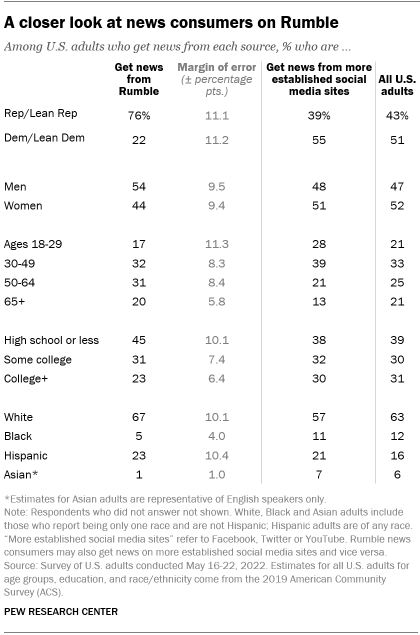
- Many of Rumble’s news consumers report having positive experiences. Around nine-in-ten of the adults who regularly get news on Rumble (88%) say they expect the news and information there to be mostly accurate, while 10% expect it to be mostly inaccurate. A large share of Rumble news consumers (69%) say the news they got there helped them better understand current events, while 12% say it made them more confused about current events.
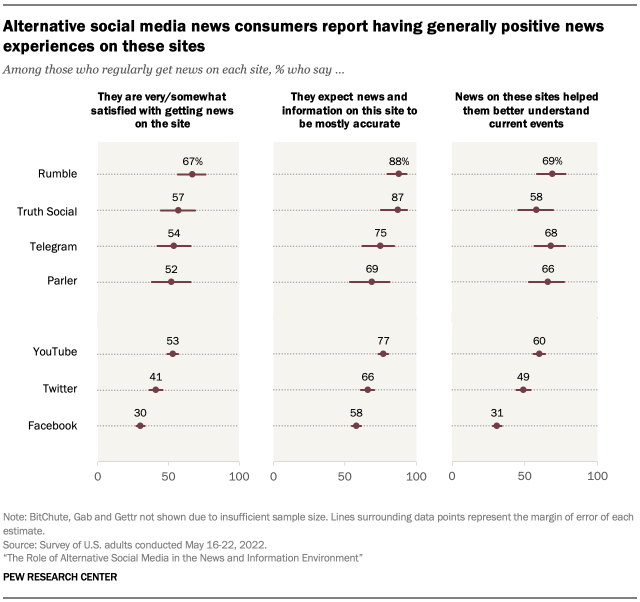
Two-thirds of those who regularly get news on Rumble (67%) say they are very or somewhat satisfied with the experience, while 12% are very or somewhat dissatisfied. Additionally, 69% of these news consumers say discussions on Rumble are mostly friendy, while 11% see mostly unfriendly discussions and 13% say they see about an equal mix of the two.
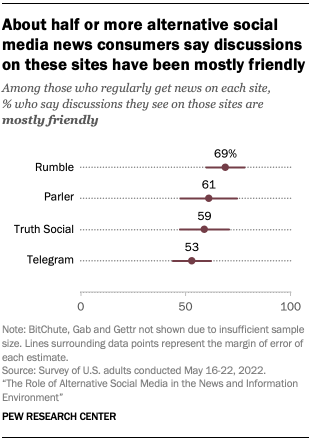
- While Rumble explicitly states that it supports free speech and opposes censorship, it has policies that allow the platform to moderate user content at least to some extent. Rumble’s website states that it is different from other Big Tech sites that “continue to embrace ‘cancel culture.’” And in December 2021, Rumble challenged New York’s online hate speech law, which requires sites to “provide and maintain a clear and easily accessible mechanism for individual users to report incidents of hateful conduct.” Still, Rumble does place some restrictions on content. A review of Rumble’s proposed moderation policies from June 2022 shows that they prohibit obscenity, stalking and discrimination.
- Most of Rumble’s prominent accounts are run by individuals, not organizations, and about a quarter have been banned or demonetized on other social media sites. The Center’s study examined 200 prominent accounts on Rumble, selected from those with the most followers. As of June 2022, about eight-in-ten accounts (78%) were individuals while 21% were organizations. About a fifth of these prominent Rumble accounts (22%) have been banned or demonetized on other platforms.
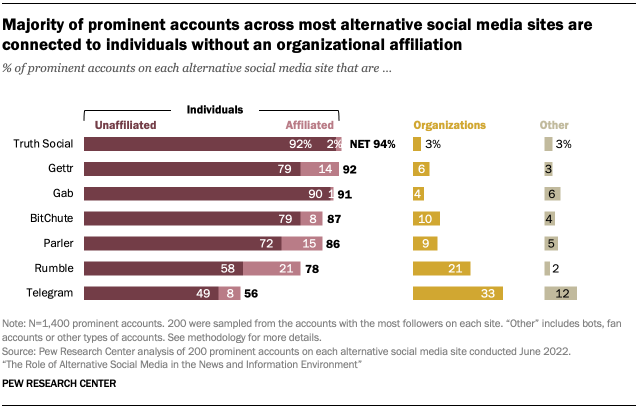
- Many prominent Rumble accounts maintain social media profiles on more established sites. Just over half of prominent accounts on Rumble (55%) promote accounts on other sites, including more established sites like Facebook, Twitter or YouTube, as well as other alternative social media sites examined in the Center’s broader study. While 44% of prominent Rumble accounts promote their accounts on more established social media sites, only 16% do so on the other alternative social media sites studied.
- Guns, abortion and LGBTQ issues were among the subjects that prominent Rumble accounts focused on in June 2022. A review of posts from these 200 prominent Rumble accounts found that about half posted about guns and gun rights (49%) or abortion (48%), 44% posted about LGBTQ issues, and 42% posted about the Jan. 6 attack on the U.S. Capitol. These posts came amid widespread discussion of major events and issues that were regularly covered in the news at the time.
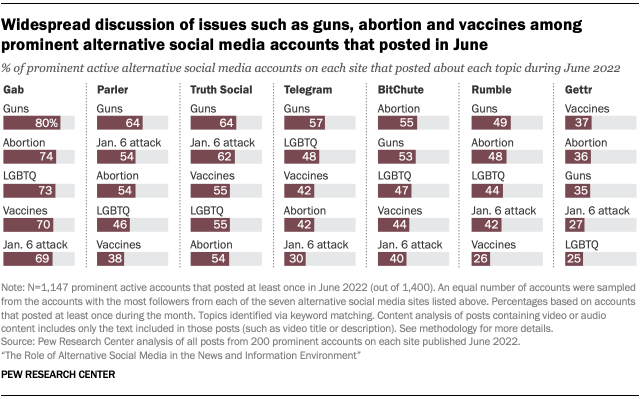
Note: Here are the questions used in the study, detailed tables and the methodology.




